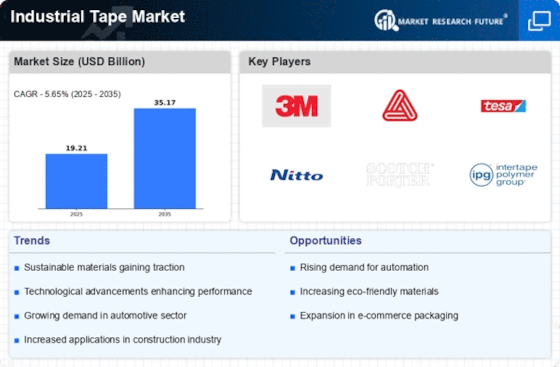Top Industry Leaders in the Industrial Tape Market
 With an ever-growing demand for strong, reliable adhesives in diverse industries, the industrial tape market is a bustling arena. driven by factors like advancements in material science, increasing automation, and rising demand for sustainable solutions. This dynamic landscape sees established giants locking horns with nimble innovators, all vying for a larger share of the adhesive pie.
With an ever-growing demand for strong, reliable adhesives in diverse industries, the industrial tape market is a bustling arena. driven by factors like advancements in material science, increasing automation, and rising demand for sustainable solutions. This dynamic landscape sees established giants locking horns with nimble innovators, all vying for a larger share of the adhesive pie.
Strategies Adopted by Key Players:
-
Product Diversification: Offering a diverse range of tapes for various applications and industries strengthens market reach. 3M's extensive portfolio of tapes for everything from construction to electronics exemplifies this strategy.
-
Embracing Innovation: Investing in R&D leads to cutting-edge solutions. Henkel's development of high-performance acrylic tapes for harsh environments and Scapa Group's self-healing tapes are examples of this innovation focus.
-
Strategic Partnerships and Acquisitions: Collaborations with material suppliers and technology providers accelerate innovation and expand reach. Avery Dennison's partnership with Dow Chemical Company for new adhesive formulations and Tesa SE's acquisition of Brady Corporation's industrial tape division illustrate this approach.
-
Focus on Sustainability: Eco-friendly materials and production processes resonate with environmentally conscious consumers. Shurtape Technologies' use of bio-based adhesives and Nitto Denko's focus on water-based tapes showcase this trend.
-
Digitalization and Customer Service: Implementing e-commerce platforms, real-time inventory tracking, and customized solutions enhance customer service and build stronger relationships with industrial manufacturers. Saint-Gobain's online ordering platform and Berry Plastics' technical support services exemplify this focus.
Factors Influencing Market Share:
-
Technological Advancements: Advancements in adhesive materials, like high-performance acrylics and silicones, and innovative tape constructions create new market opportunities. Companies offering cutting-edge solutions gain an edge. -
Regulatory Landscape: Evolving regulations around volatile organic compounds (VOCs) and hazardous materials impact tape formulations and production processes. Adapting to these regulations swiftly is crucial for success. -
Cost-Effectiveness and Efficiency: Balancing affordability with high performance remains a primary concern. Companies employing lean manufacturing processes and leveraging economies of scale gain an advantage. -
Regional Growth and Demand: The rise of manufacturing in emerging markets like China and India drives demand for industrial tapes. Companies with strong regional presence and distribution networks gain an advantage. -
Customization and Niche Applications: Providing tailored solutions for specific industrial needs expands market reach. Bemis Company Inc.'s focus on high-temperature tapes for aircraft assembly and Lintec Corporation's expertise in medical tapes exemplify this trend.
Key Players:
Saint Gobain SA (France)
The Dow Chemical Company (U.S)
Pro Tapes & Specialties Inc. (U.S)
Eastman Chemical Company (U.S)
Sika AG (Switzerland)
Scapa Group Plc (U.K)
Shurtape Technologies
3M Company (U.S)
KGaA (Germany)
Ashland Inc. (U.S)
Avery Dennison Corporation (U.S)
Von Roll Holding AG (Switzerland)
Henkel AG & Company
Recent Developments:
-
August 2023: Henkel acquires Henkelman, a leading manufacturer of double-sided tapes, strengthening their position in the building and construction sector. -
September 2023: Avery Dennison launches a new line of pressure-sensitive tapes specifically designed for e-commerce packaging, catering to the booming online retail market. -
October 2023: Tesa and Evonik collaborate to develop high-performance tapes for electric vehicle batteries, highlighting the focus on sustainable mobility solutions. -
November 2023: Nitto Denko unveils a bio-based pressure-sensitive adhesive, contributing to the industry's move towards more eco-friendly alternatives.










